Roads Less Traveled

In the age of eye-catching employee benefits and endless discussions of “company culture,” many Americans expect more from their jobs than stable employment alone. Gone are the days of grinding away and feeling grateful for a steady paycheck: Employees today want work with purpose. If they fail to find it, the digital age offers workers more alternatives than ever. The possibilities of internet entrepreneurship seem endless, and the freelance economy promises flexible hours and the freedom to travel.
But this rosy picture requires a reality check. How many Americans actually make the leap to pursue the job of their dreams? If they’re not pursuing their ideal form of employment, which obstacles stand in their way? What defines a great job for today’s workforce anyway?
We set out to answer these questions, asking more than 1,000 people what their dream jobs would be and whether they’d actually pursued them. Our findings present a compelling view of Americans’ professional aspirations and frustrations in the 21st century, and powerful insights for the modern employer. Keep reading to learn and what fulfilling work means for Americans today.
Rolling the Dice on a Dream Job
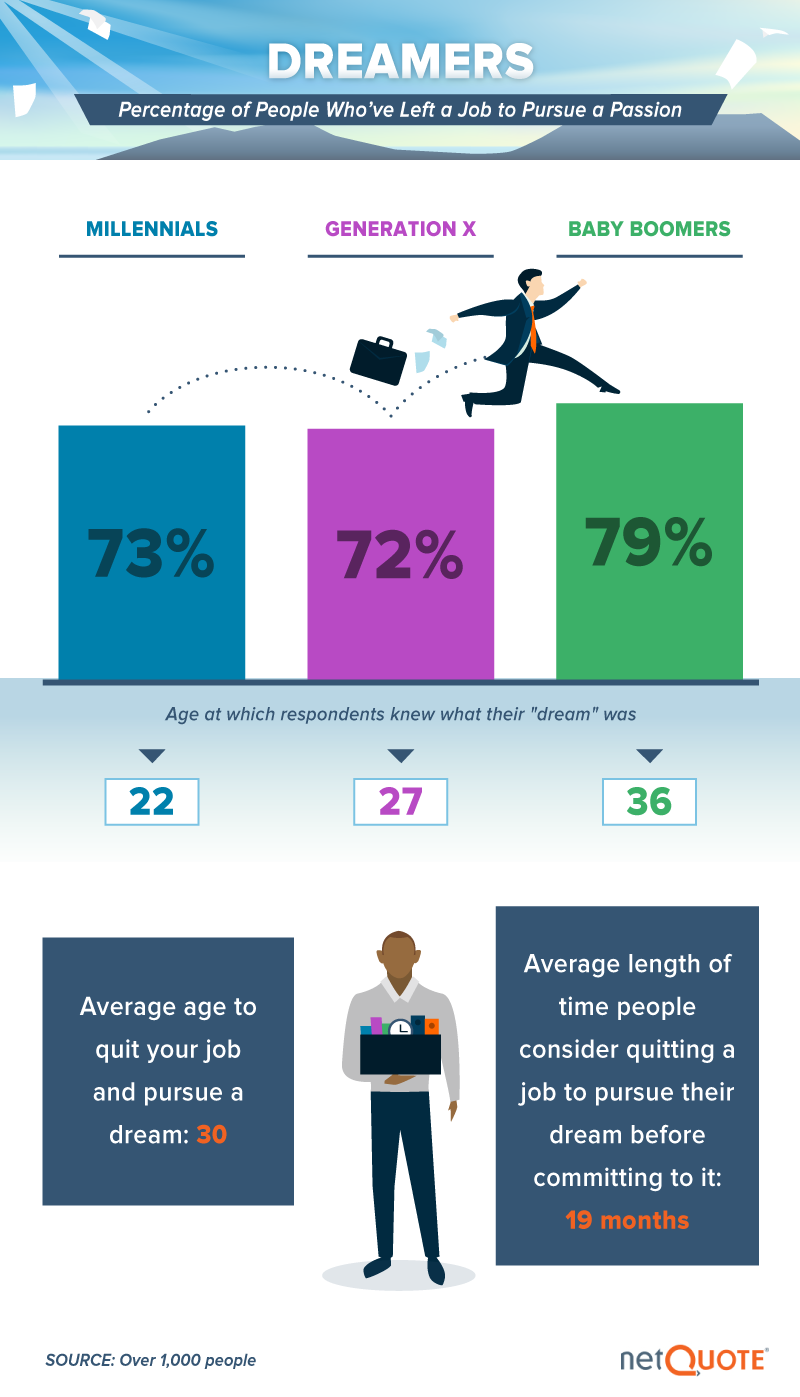
According to our findings, the attraction of a dream job speaks to Americans young and old alike. Among millennials, Gen Xers and Baby Boomers, more than seven in 10 respondents had left a job to pursue their passions. Interestingly, millennials seemed to recognize their ideal profession earlier in life than older generations did. Baby Boomers, who didn’t find their true calling until age 36 on average, might suggest millennials are too young to know their true callings in their early 20s.
Whenever they conceived on their dream job, however, 30 was the average age for actually making the leap. That transition was typically preceded by significant deliberation: People weighed the move for more than a year and a half on average before taking the plunge. If Americans spend all this time considering their moves before making them, what’s so great about their current gigs that they hesitate to leave them?
Perks of Current Professions
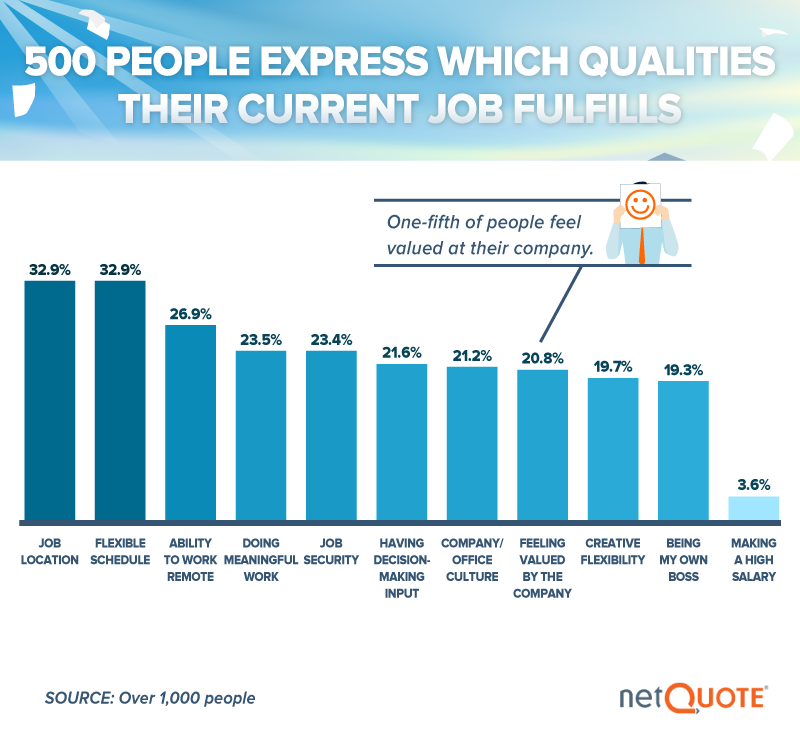
Nearly a third of respondents said their current jobs had a good locations, a perk some experts say keeps talented workers in lousy jobs. Roughly the same percentage appreciated their employer’s flexible scheduling. Additionally, more than a quarter of respondents said they possessed the ability to work remotely – reflecting the vast increase in telecommuting opportunities since the turn of the century. It’s easy to see what these advantages have in common: They emphasize convenience rather than passion.
To be fair, more than fifth of respondents said their current job did afford them the opportunity to do meaningful work. A similar portion of participants said they felt valued, and enjoyed a good company culture. But these percentages still seem strikingly small, especially given that just 3.6 percent said they earn high salaries of the kind that might justify these compromises. If Americans had their choice, wouldn’t they want more from their work?
Dream Career Criteria
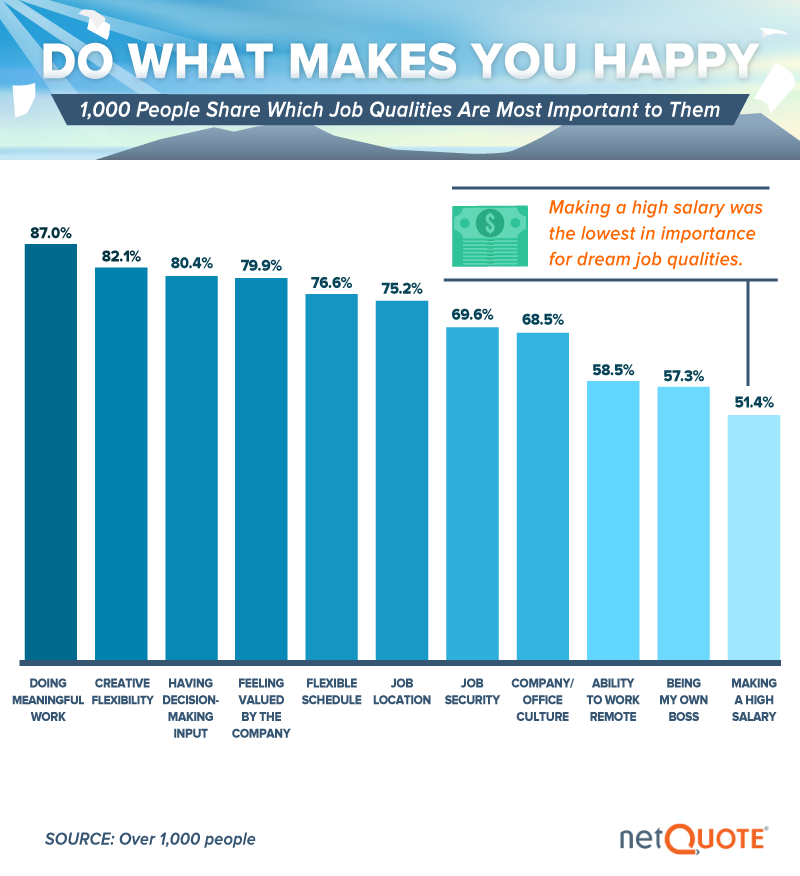
87 percent of our participants said their dream jobs would entail meaningful work, an ideal that all age groups share according to previous research. Creative flexibility was the second-most cited dream job characteristic, though some experts suggest creativity lies more in the ways we conceive of our work than what it actually entails. Other common dream jobs features seemed more to do with professional impact and authority: Roughly eight in 10 respondents said wanted to feel valued and have decision-making power.
Many of the logistical considerations people valued in their current jobs were also mentioned in connection with dream jobs: More than three quarters mentioned flexible schedules and good locations, for instance. But one dream job perk some would assume to be essential was actually just an afterthought: Cash. Merely 51.4 percent said their dream gig would include a high salary. At least when it comes to wishful thinking about work, our data suggest that money really is isn’t everything.
Current Field vs. Fantasy
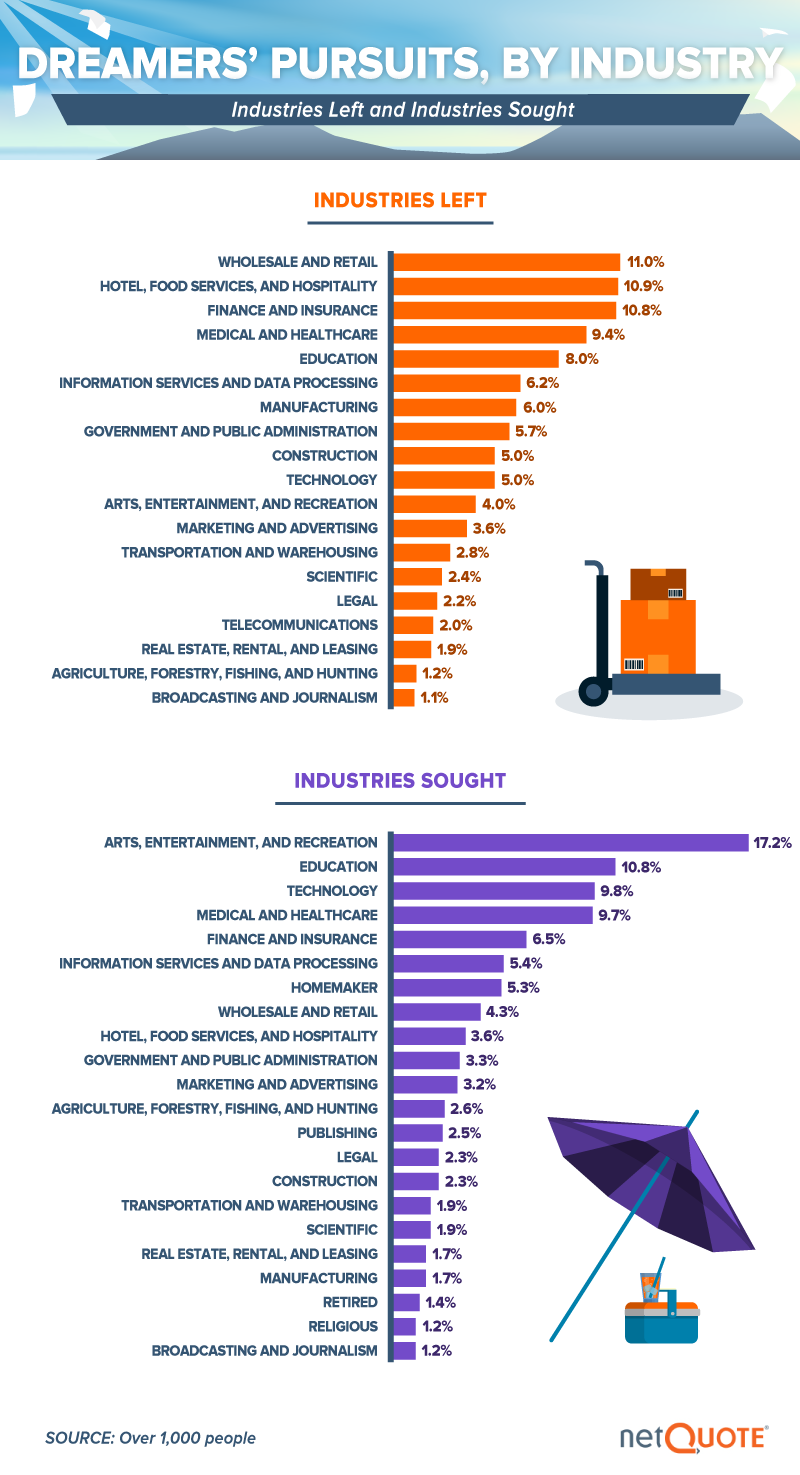
Among those who do take the plunge and pursue the employment of their dreams, which fields are they leaving – and seeking? Retail and wholesale positions had the greatest rate of attrition; experts attribute high turnover in those fields to the repetitive nature of the work. A similar percentage left jobs in the food service and hospitality sector, perhaps to to the stress endemic in that industry. Former finance and insurance professionals also made the leap quite often, possibly to the benefit of their wellbeing. Recent studies have shown high rates of mental ill health in that sector.
The field these dream job seekers entered most often was arts, entertainment, and recreation. This time-honored search for creative fulfillment has actually been transformed by social media, which can reduce the barriers to attracting an audience for one’s endeavors. Education was another field many sought, an interesting counter narrative to the high rates of attrition among America’s teachers. 
Of course, many drastic career changes often require new qualifications, including additional education in some cases. More than 43 percent of those who pursued their dreams did continue to their education to achieve that goal. This trend may account for the growing number of older adults in college classrooms currently. These days, more than a quarter of college students are 30 or older, often because they are seeking new careers.
Dream Job Disappointment?
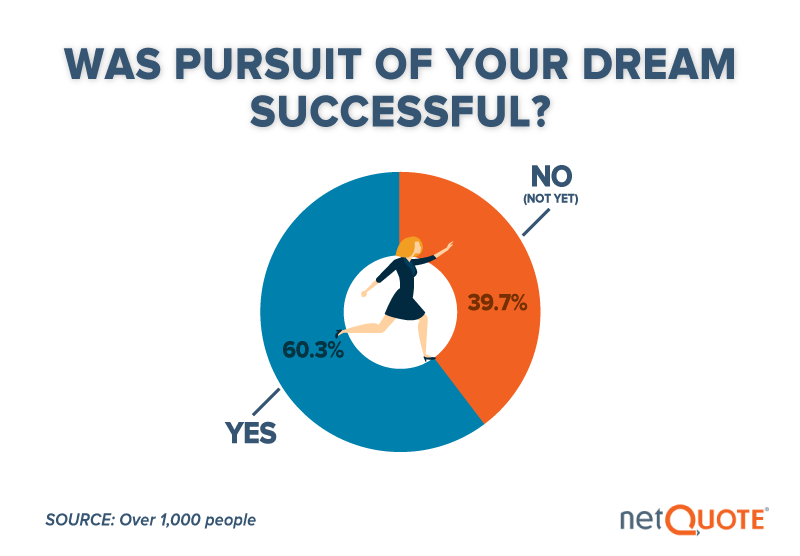
When we asked those who took a chance on their dream jobs about the outcome of their gamble, our results suggest that the risk pays off in most cases. About 6 in 10 respondents said they were successful in pursuing of their dreams, which should encourage those considering such a move currently.
But success can mean vastly different things to different people, especially using the lofty “dream job” standard. How many workers found their new gig met their expectations, once they actually got it?
Work for Work’s Sake?
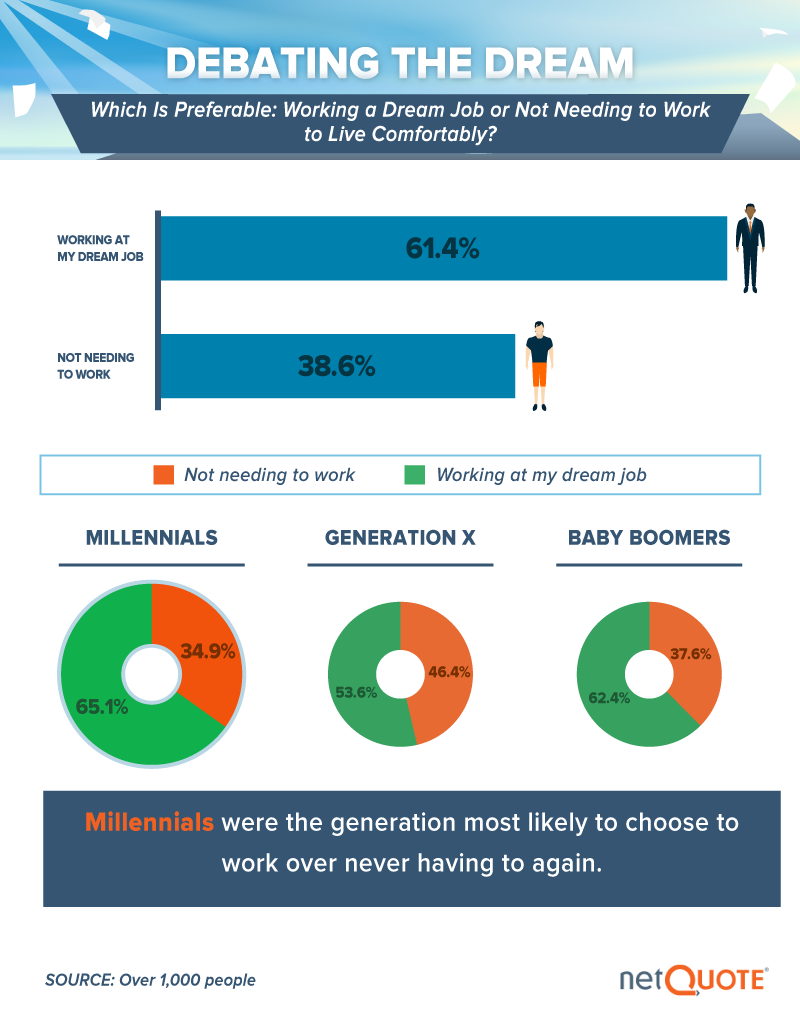
Research has repeatedly shown that unemployment correlates with unhappiness, but the prospect of not needing to work still sounds pretty enticing to some Americans. In fact, 38.6 percent of respondents said they’d prefer not working at all to employment in their dream job – if they could live comfortably without it. This sentiment was strongest among Gen Xers, who are presumably decades away from retirement in most cases. Interestingly, 62 percent of Baby Boomers chose their dream jobs over taking it easy. Perhaps seniors are working later in life than ever before for more reasons than money.
Millennials, however, were the most likely generation to choose working a dream job over a life of leisure. This finding confirms a body of research suggesting millennials seek purpose in their employment, though compensation is clearly an important concern as well. Of course, most employees don’t choose between purposeful work and no employment at all. The far more common consideration is whether to take a more lucrative position that lacks meaning, or compromise on salary to seek fulfillment.
How Much Pay is Purpose Worth?
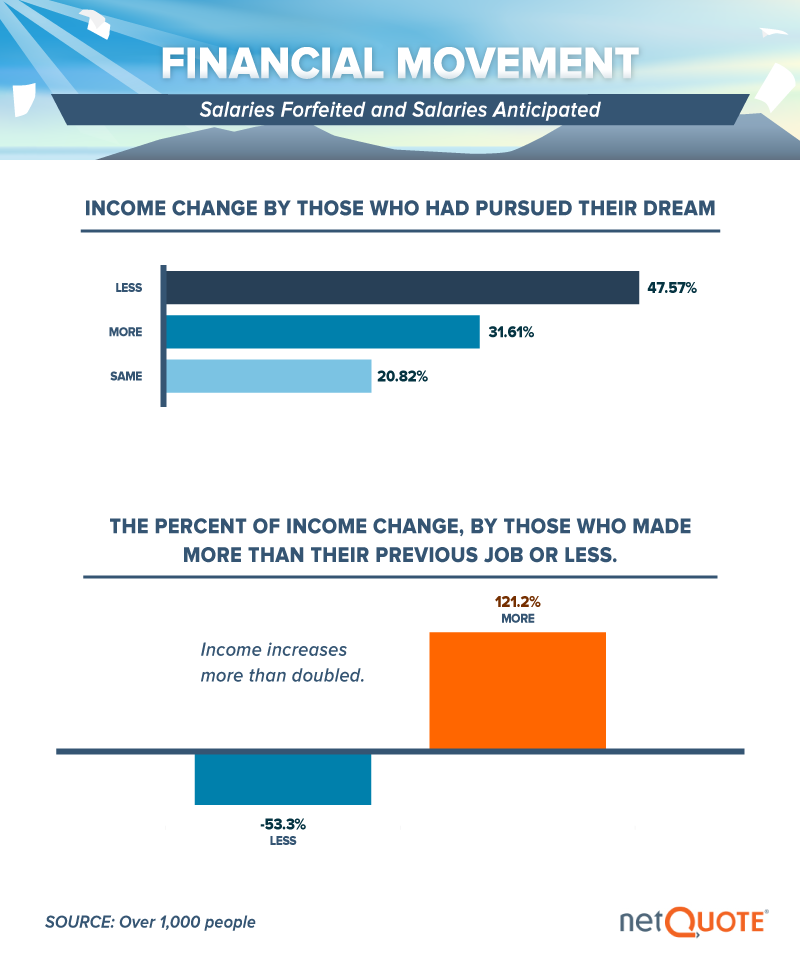
Many people when deciding on their career or a career change ultimately make their decision for financial reasons rather than existential ones. We wanted to know how people’s finances changed when leaving behind what we know to pursue what we want. Nearly half of people reported earning less who had obtained their dream job.
But just how much less were they earning? What we found was that on average, if one is ends up making less pursuing their dream, they cut their salaries in half. However, on the flip side, if you end up making more than your previous salary, people report making over 120% more than in their previous jobs.
From Aspiration to Occupation
Our data suggest many do succeed in attaining their dream employment – though often at substantial financial cost. But perhaps money is a poor measure of the rewards they truly reap; our findings indicate they’re more likely to be motivated by a sense of purpose anyway. If you’re resisting the job of your dreams due to financial concerns, you’re right to proceed cautiously. But you may find another form of enrichment once you make the leap – one that more than makes up for the earnings you leave behind.
If you’ve recently created a dream job of your own by founding your own small business, you’ll need all the help you can get to protect it from future threats. Let netQuote help you evaluate your options and find coverage from leading companies at industry-best prices. We’ll help keep you prepared for every reality, so you can keep building your dream.
Methodology
We surveyed 1051 people. 553 identified as female and 494 identified as male with 4 identifying as genderfluid. A separate 500 person survey was run to find out how different qualities are fulfilled by working people.
Fair Use Statement
We grant permission to use the images found on this page freely. When doing so, we ask that you kindly attribute the creators by linking to this page so your readers can learn more about the project and its methodology.
